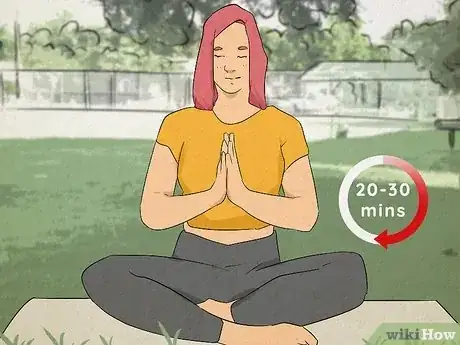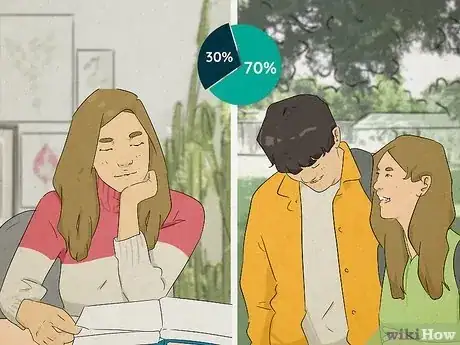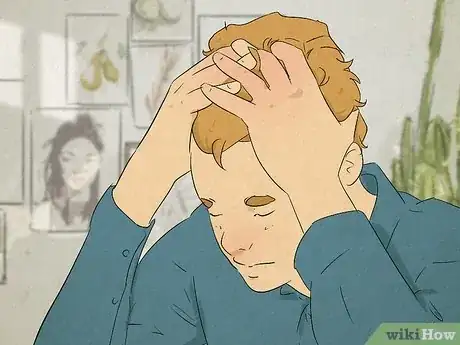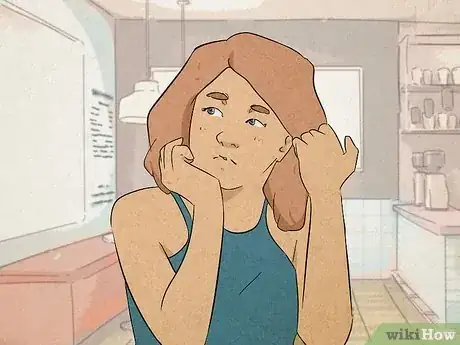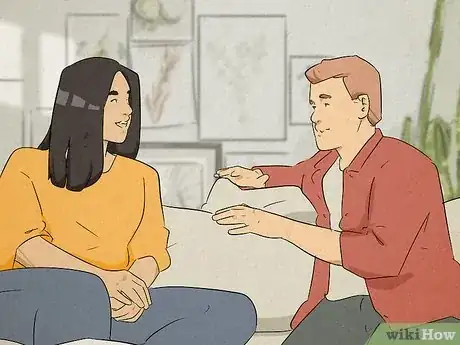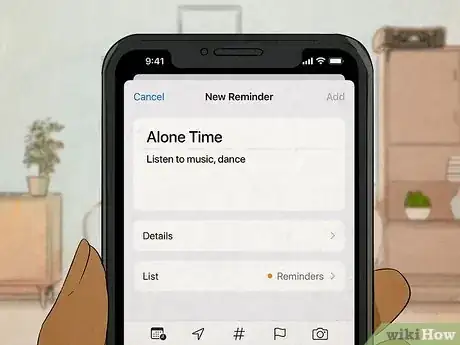This article was written by Jennifer Butler, MSW and by wikiHow staff writer, Hannah Madden. Jennifer Butler is a Love & Transformation Coach and the Owner of JennJoyCoaching, a life coaching business based in Miami, Florida, although Jennifer works with clients all over the world. Jennifer’s work centers around empowering women who are navigating any stage of the divorce or breakup process. She has over four years of life coaching experience. She is also the co-host of the Deep Chats Podcast along with Leah Morris and the host of season 2 “Divorce and Other Things You Can Handle” by Worthy. Her work has been featured in ESME, DivorceForce, and Divorced Girl Smiling. She received her Masters of Social Work (MSW) from New York University. She is also a Certified Health Coach, a Communications & Life Mastery Specialist, and a Certified Conscious Uncoupling and Calling in “the One” coach.
There are 8 references cited in this article, which can be found at the bottom of the page.
This article has been viewed 21,281 times.
Your partner is your favorite person in the whole world—so why do you feel like you need time away from them? Craving alone time in a relationship can feel strange, but actually, it can help you create a stronger, healthier relationship with your partner and your family. In this article, we’ll tell you how much alone time you might need and how to get it on a daily basis so you can feel relaxed and refreshed.
This article is based on an interview with our love and transformation coach, Jennifer Butler, MSW, owner of JennJoyCoaching. Check out the full interview here.
Steps
Is alone time normal in a relationship?
-
Yes, alone time is necessary for a healthy relationship. In the movies, you might see couples who spend 100% of their time together without a break. In real life, though, everyone needs to take some time for themselves. If your partner asks you for alone time or you feel like you want to spend some time on your own, don’t worry—it’s normal to hang out on your own every now and then.[1] X Research source
- Spending time by yourself lets you focus on your own needs and desires. People who spend more time on their own experience more growth and personal development overall.
How much alone time do I need?
-
1Experts recommend getting 20-30 minutes of alone time every day. This doesn’t necessarily mean you have to leave the house and go somewhere on your own—you might sit at the table and drink a cup of coffee by yourself, or bring a book to bed and read it on your own. These small moments of comfort will help you relax and come back refreshed.[2] X Research source
- It can be scary to spend time on your own if you’re not used to it. The best thing you can do is push forward and face your fears. In time, it will get easier.
- On the flip side, spending the majority of your time alone isn’t healthy, either. Balance is key here—if you feel like you and your partner never spend any quality time together, it’s time for a conversation with them.
-
2Aim to spend 70% of your time with your partner and 30% of your time alone. This 70/30 balance is a good way to break up your time without feeling overwhelmed. For instance, you might spend 4 or 5 days a week together with your partner and 2 or 3 days apart. That way, you’re both getting your needs met, and neither one of you feels lonely or stressed out.[3] X Research source
- Some people also use the 80/20 rule, where 80% of their time is with their partner and 20% of it is on their own.
-
3Everybody is different, which means that our alone time needs vary. You might need alone time every other day, while your partner only needs alone time once a week. Make sure you talk with your partner about your needs, and listen to their needs as well.[4] X Research source
- Start the conversation by saying something like, “Hey honey, I wanted to talk about how much time we spend together. You know I love hanging out with you, but I think I need some alone time, too. It will help me decompress and be less stressed throughout the day.”
- If your partner is the one asking for alone time, try to hear them out, and don’t take it personally. It’s not that they need time away from you, specifically—they need time away from everyone.
Benefits of Alone Time
-
1You learn more about yourself. It’s easy to feel guilty about your need for alone time. However, spending time on your own leads to a happier, healthier you, which makes you a better partner. When you spend time alone, you have a chance to reflect on where you are in life and who you are as a person. You can use your alone time to think about your goals for the future and how much you’ve accomplished already.[5] X Trustworthy Source PubMed Central Journal archive from the U.S. National Institutes of Health Go to source To help learn more about yourself, you could try:
- Journaling
- Meditating
- Writing a gratitude list
-
2You get time for self care. Doing something nice for yourself is a great way to relax and calm your nerves. It doesn’t have to be anything huge—even small things can help you reconnect with yourself.[6] X Trustworthy Source PubMed Central Journal archive from the U.S. National Institutes of Health Go to source You could try:
- Making yourself a cup of coffee or tea
- Going on a walk around the block
- Soaking in a bubble bath
- Reading 10 pages of a new book
- Listening to music
-
3You have time to explore your hobbies and interests. When you get some time alone, you can do the things that you really want to do. Use your free time to your advantage, and pick up a new hobby or skill (or enjoy the one you already know how to do).[7] X Research source Don’t have anything you love right now? You could try:
- Doing embroidery
- Hiking
- Doing puzzles
- Roller skating
Signs You Might Need More Alone Time
-
1You feel drained or fatigued. Being around someone all the time (even your partner) can be tiring. If you constantly feel like you can’t catch up on sleep, it might be that you need to spend more time alone.[8] X Research source
- This is especially true if you’re an introvert. Introverts rest and recharge by themselves, while extroverts get energy from being around other people.
-
2You’re irritated or on edge. When you’re around people all the time, it can start to wear on your nerves. If you find yourself snapping at your partner or getting mad about little things, you might just need a break. Spend some time on your own to recharge so you feel more calm overall.[9] X Research source
-
3You haven’t done anything for yourself in a while. When’s the last time you did something nice for yourself without involving anyone else? If you can’t remember the last time you practiced self care, it’s time for some alone time.[10] X Research source
How do you get alone time while raising a family?
-
1Schedule your break times with your partner. Getting alone time when you have kids can be tough. Try to schedule in small, 20 minute breaks where your partner can take the kids. Then, go somewhere in the house where you can be alone, like your bedroom or the bathroom.[11] X Trustworthy Source Cleveland Clinic Educational website from one of the world's leading hospitals Go to source
- Or, get out of the house by going on a short drive or a walk around the block.
- An easy way to do this is to give yourself 30 minutes when you wake up and 30 minutes before you go to bed.
-
2Set a reminder for alone time on your phone. It can be tough to remember to give yourself breaks during the day. Try setting 3 or 4 alarms on your phone to give yourself small breaks throughout the day. They don’t have to be long—even 5 minutes is enough to reset.
- Don’t have a ton of time? Try taking 10 deep breaths to slow your breathing and calm your mind.
- Or, go outside and look at the clouds for 30 seconds.
-
3Do something you enjoy while you’re alone. Use your time to your advantage to feel refreshed and calm again. Instead of scrolling through social media or watching TV (activities which can actually leave you feeling more drained), do something you like that will soothe you. You might do a hobby, try meditation, do a craft, or exercise.[12] X Trustworthy Source Cleveland Clinic Educational website from one of the world's leading hospitals Go to source
You Might Also Like

 Signs Your Ex Will Eventually Come Back
Signs Your Ex Will Eventually Come Back


 What Are the Bases in a Relationship? Defining the Baseball-Sex Metaphor
What Are the Bases in a Relationship? Defining the Baseball-Sex Metaphor
 The Top Emojis a Girl Will Use if She Likes You
The Top Emojis a Girl Will Use if She Likes You
 How to Tell if Your Girlfriend Is Horny: 12 Signs She's Turned On
How to Tell if Your Girlfriend Is Horny: 12 Signs She's Turned On
 What to Do When Your Girlfriend Is Mad at You (10+ Steps to Take)
What to Do When Your Girlfriend Is Mad at You (10+ Steps to Take)
 12+ Texts to Send Your Girlfriend After a Fight: Apologies & More
12+ Texts to Send Your Girlfriend After a Fight: Apologies & More
 How to Have Phone Sex with Your Girlfriend
How to Have Phone Sex with Your Girlfriend

 33 Sweet & Romantic Apology Messages for Your Love
33 Sweet & Romantic Apology Messages for Your Love

 12 Ways to Break a Narcissist's Heart
12 Ways to Break a Narcissist's Heart
References
- ↑ https://www.psychologytoday.com/us/blog/lifetime-connections/201803/alone-time-keeps-relationships-healthy
- ↑ https://www.psychologytoday.com/us/blog/the-secret-lives-introverts/201712/7-ways-spending-time-alone-will-change-your-life
- ↑ https://happiful.com/the-80-20-relationship-rule/
- ↑ https://www.abc.net.au/everyday/alone-time-when-in-a-relationship/10342330
- ↑ https://www.ncbi.nlm.nih.gov/pmc/articles/PMC8591032/
- ↑ https://www.ncbi.nlm.nih.gov/pmc/articles/PMC8591032/
- ↑ https://scholarsarchive.byu.edu/cgi/viewcontent.cgi?article=1017&context=familyperspectives
- ↑ https://www.psychologytoday.com/us/blog/the-secret-lives-introverts/201712/7-ways-spending-time-alone-will-change-your-life
- ↑ https://www.psychologytoday.com/us/blog/the-secret-lives-introverts/201712/7-ways-spending-time-alone-will-change-your-life
- ↑ https://www.psychologytoday.com/us/blog/the-secret-lives-introverts/201712/7-ways-spending-time-alone-will-change-your-life
- ↑ https://health.clevelandclinic.org/how-to-get-some-much-needed-alone-time-while-raising-a-family/
- ↑ https://health.clevelandclinic.org/how-to-get-some-much-needed-alone-time-while-raising-a-family/
About This Article


